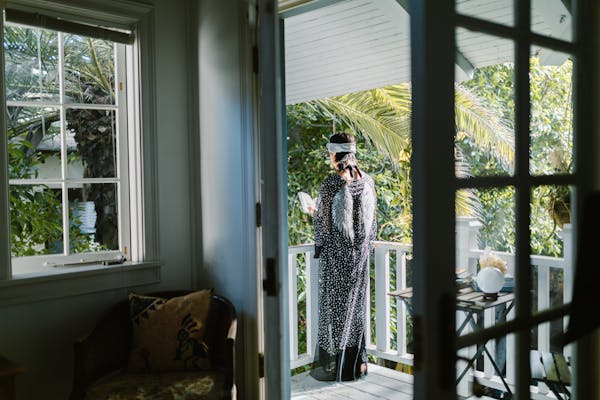Biomutant beginner’s guide, tips, and tricks
Biomutant is a role-playing game where your experience tends to be differentiated more by character alignment rather than by their build of attributes and gear. The first two hours of Biomutant onboard the player to the world’s lore; its combat, crafting, and other systems; and then send them off on their first main mission.
This Biomutant beginner’s guide will help you understand the game’s story, the ethos that informs the choices you have to make, and the initial choices themselves, so that you can shape your character and your story in a sensible way.
For more on how to develop a starting character and what Biomutant’s different “classes” entail, visit our Biomutant character creation guide.
Aura means good and bad, but not always evil
A character’s aura — whether they have a light or a dark side to their behavior — is a key distinction of Biomutant. Not only do the choices you make push this aura toward lightness or darkness, but your dialogue responses affect it more subtly, too.
NPC dialogue also changes based on your aura, as it changes what in-world characters expect from you. But a good rule of thumb, when presented with a choice, is that the option or dialogue on the left expresses your dark side, and the option to the right is the light side.
“Dark” does not necessarily mean “evil.” It means your character simply did not make a choice along moral lines.
Alignment affects gameplay both in the dialogue options and in the availability of psionic mutations. Some are unlocked with PSI-points that can only be earned as a result of light aura or dark aura choices.
:no_upscale()/cdn.vox-cdn.com/uploads/chorus_asset/file/22536661/Biomutant_20210521153613.jpg)
Character creation: Race, structure, and resilience
Our more detailed Biomutant character creation guide can help you understand this process better, but as it pertains to your long-term experience within Biomutant, here is some advice with character creation.
Races
To start, you’re given the choice of five races — Primal, Dumdon, Rex, Hyla, Fip, and Murgel. While these classes are differentiated — Rex has great starting Health, Dumdon the best starting melee damage — these differences are relatively small and do not limit any playing style through the first two hours.
If you were to pick based on looks alone, you’d still be fine. At any rate, in the onboarding level to come, you will quickly add +10 to an attribute of your choosing. Every level-up lets you add +10 to an attribute, and there is no cap based on the starting race.
Genetic structure
The second step, defining genetic structure, is where you can push your character’s genetic makeup in the direction of the attributes you value most. Notice that moving within the circle not only changes the character’s starting Vitality, Strength, Agility, Intellect and Charisma, but it also changes their size and appearance.
Mess around with the analog mutation circle, but don’t worry about fine-tuning your scores too much. If you’re indecisive, you can randomize your character with the press of a button.
Genetic resilience
The third step, choosing a genetic resilience, does not have any bearing on the initial sections of Biomutant either. Furthermore, you can upgrade resistances as you progress in-world. For now, this gives your character’s right hand a different color, and that’s about it. Fur style and colors are also both purely aesthetic; push to the outer edges of the wheel to see more patterns if the core ones are not to your liking.
Pick a class based on interesting perks
There are five classes to go with the five races. However, this choice largely boils down to which starting perk you want, as upgrades and mutations later on will let you mix and match the perks that were available at the beginning.
Dead-Eye, which is the character on the box art, is a good blend of ranged and melee combat. Although they possess an auto-reload trait that automatically imparts bonus damage with the next clip, remember that it takes time to reload. It’s still faster to manually key it rather than wait for the game to do it for you.
From there, Saboteur might be the next most useful class. Dodging attacks costs energy, and Saboteurs lose 20% percent less energy from dodges. Keep this in mind if you prefer a melee class and an active defense.
Commando is a damage-dealer, and Sentinel is a tank. Commando gets a 10% bonus on ranged weapon attacks (they also carry an assault rifle), and Sentinels have a bonus of 10 armor. Psi-Freak will start with a Spark Ball ranged psionic attack.
:no_upscale()/cdn.vox-cdn.com/uploads/chorus_asset/file/22536664/Biomutant_20210521161651.jpg)
The Bunker Level tutorial
Most of Biomutant’s first hour or so is given to presenting the world’s lore and showing you how things work. It proceeds very linearly and without any opportunity for side exploration. Take this opportunity to learn how melee combat works in Biomutant.
In particular, work on timing your parries (L1 or Left Bumper). Enemies that are attacking have little lightning bolt icons over their head. Perfectly timed parries disorient the attacker and allow you to launch them into the air on a counter attack, landing a mid-air combo for massive damage. Practice it here, while the stakes are low.
Your first alignment choice
At the beginning, you’ll come to a fork in the road and be asked to pick whether you have a dark or light nature. You’ll see your two sides — a classic angel-and-devil-on-the-shoulder pairing — bicker and fight. Know that whatever you choose here, it’s not permanent. You can change it by your actions later.
That said, pay attention to how you answer questions when given a dialogue choice. Again: left is dark, and right is light. This will become important later. After you leave the bunker serving as the tutorial level, your mentor Out-of-Date will suggest you align yourself with one of two tribes. You are free to pick either for any reason, but if you have a dark aura, Out-of-Date will recommend you seek the Jagni. A light aura, he recommends the Myriad.
Your first Wung-Fu skill
Wung-Fu is a set of unlockable combat combos, both melee and ranged. As you progress, you can use level-up tokens to reveal certain new combos. Your first combat skill upgrade opportunity, inside the bunker, will offer an unarmed fighting combo, a two-hand slash combo (single-weapon melee), or a gun combo. A good first choice is the Wicked Wolf combo, under two-handed slash. It’s easy to remember (Square or X twice, followed by Triangle or Y).
It’s analogous to the Crane Dance, which is a combo found under the gun tab, and is R2/Right Trigger twice, followed by Triangle/Y. The Crane Dance flings out your sword and then, after it returns, spins you like a top for large damage. Both of these have limited range, so using Crane Dance in a cluster of enemies is best.
Your first biogenetic mutation
After you defeat the low-level Iron Wall character (which is a mini-tutorial about breaking down an enemy’s defense) you will encounter a trio of Morks. These are the buglike things ejected from a seething, neon green butthole-looking thing on a wall. After defeating them, you’ll acquire 3 Bio-blobs. Bio-blobs add Bio-Points that unlock biogenetic mutations from the Mutations tab of the character menu. The first two available are Mothmouth, which will make enemies fight each other; and Vile Bile, an acid attack with a large area of effect. I chose Mothmouth as it seemed more useful against a crowd of enemies.
After leaving the bunker and observing the Worldeater destroy a village, you’re presented with a big chance to influence your alignment. In the village will be an NPC who needs help. Offering your help does not trigger a side quest or any obligation. It simply boosts your light aura. Likewise, leaving the NPC to manage for himself will goose the dark side of your aura.
After this encounter, Out-of-Date will appear to suggest the tribe you join. Again, this is not determinant; you may align with the Jagni or the Myriad regardless of your aura.
:no_upscale()/cdn.vox-cdn.com/uploads/chorus_asset/file/22536653/Biomutant_20210521001215.jpg)
Myriad: Light; Jagni: Dark
The process of joining one tribe or the other is locked. You must choose Jagni or Myriad, and rejecting one will effectively choose the other for you.
Allying with the Jagni means you will be working to destroy the Tree of Life, as part of a general cleansing of the world. It conflicts with what Out-of-Date says to you when he makes his recommendation — that allying with the Jagni can still serve light-hearted goals. Nonetheless, Biomutant explicitly says that the destruction of the Tree of Life becomes your end-of-game goal with that choice.
Allying with the Myriad means you will be working to save the Tree of Life from the Worldeaters, as Out-of-Date says. It’s the clearer and less conflicted choice, for sure.
Visit either tribe’s fortress and Sifu after Out-of-Date makes his recommendation. Along the way, you’ll encounter two patrols of Jagni and Myriad fighting it out. Help whomever you like; the outcome of this fight won’t follow you. As you approach the forts, rummage around the trenches and in the watchtowers, you’ll find health kits.
The visits to the Jagni and Myriad chiefs are identical. Both talk about your mother, both talk about their philosophy of the tribal war, both ask you to join. You may reject the offer, and they will ask you to reconsider. If you reject them for good, you leave their fortress peacefully, but you now have no choice but to ally with the rival tribe to move the story forward. When you visit the rival tribe, there is no option to refuse an alliance.
Quick-timer events: Look closely for the cue
After making your alliance, you’ll be sent to join up with your tribe’s war party in one of the territories the Sifu says need to be conquered. This trip will take you through your old destroyed village and another flashback sequence where you learn about crafting, swimming, and other basics.
Again, all of this proceeds linearly, and self-explanatorily: Go here, search this. The set piece with Lupa-Lupin (the large enemy who destroys your village and kills your parents) includes a button prompt that can be hard to miss. When you and your mother are fighting him, your goal is to whittle down his health bar by one segment; then you will see a Triangle or Y prompt over him, as he is recovering his strength. Hit that, and you will move into the second part of the cinematic.
Likewise, the water can be frustrating because Lupa-Lupin will separate you from your mother if you swim to the dock too close to the center of the screen. Your father advises you to be carried by the surf. Push to the right of the screen and you will eventually trigger the cutscene that gets you out of this flashback.
Off to war
Biomutant wastes no time getting to the showdown of core chapters. Once you join the war party, you’ll be invading a rival tribe’s outpost. It’s a multi-stage combat level that is easily beaten, provided you are fighting sensibly and using parry and dodge defenses.
One thing to remember: At the interior drawbridge where the enemy is lobbing bombs at you from inside the wall, you are supposed to hit Square/X when one of them whizzes by you and time slows down. This will swat the bomb back at the cannon and blow it up. Again, when a quick-timer event is involved, Biomutant does a poor job of explaining what you’re supposed to do. Don’t stand there firing at the bomber, or trying to solve the puzzle on the side of the wall.





